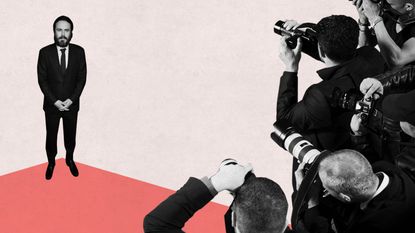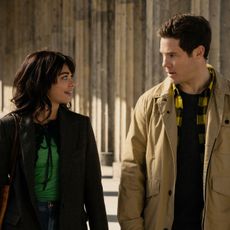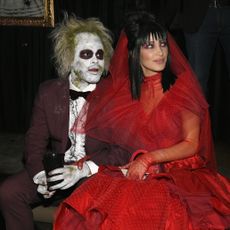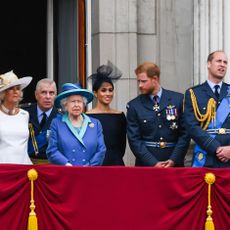
It started with my spontaneous Instagram of Casey Affleck. He was on a magazine cover heralded for giving one of "the year's best performances," so I posted it with the hurried caption "with all due respect—barf." Before long, people were debating Affleck's credibility in the comments, and a friend of mine (note: he's a white, liberal male) chimed in to inform mansplain to me that Affleck's recent headlines, while creepy, described mere "harassment"—not "assault."
Let's back up for a moment: Casey Affleck was hit with twin lawsuits in 2010—both from women who worked on his mockumentary I'm Still Here. They alleged that Affleck discussed his sexual exploits during filming, forced a crew member to flash his genitals to them, attempted to persuade one of them to stay in his hotel room using physical force and intimidation, and crawled into bed with one of them while she was sleeping. She says she awoke to find him in his underwear, his arms around her and his hands touching her body. (Court documents are available both here and here. Affleck vehemently denied the accusations and threatened to countersue; both cases were settled out of court.)
This doesn't sound like simple "harassment," right? And regardless of whether he actually committed the acts he was accused of committing, downplaying the women's claims only serves to justify sexual violence. That kind of thinking contributes to an environment that lets abusers—especially white ones—off the hook.
It's time to shut these arguments down, one by one.

It makes people squeamish to think a famous person they like might have assaulted someone. Maybe she lied, they say. After all, who is she? She's nobody, so shaming her is easy. We can keep watching Oscar-nominated movies without feeling guilty if she is overreacting.
But why would a woman risk her career over "nothing," only to be known as a famous actor's victim? Think of all the inappropriate sexual behavior or commentary you've witnessed in the workplace. Then imagine how extreme this behavior would have to be for you to go to HR. Rather than assume women have blown things out of proportion, we should probably assume that we've only heard the half of it.

This reasoning—aside from being wildly unfair—completely ignores the power dynamics of Hollywood, not to mention society in general. And even if a woman could "just quit" her job, she shouldn't have to. The onus should be on the abuser to change, not the victim.
Stay In The Know
Marie Claire email subscribers get intel on fashion and beauty trends, hot-off-the-press celebrity news, and more. Sign up here.

To critique the timing of any woman speaking out against an abuser is to assume we know what it feels like to be ready to speak out. The most sinister thing about sexual violence is that it's so ingrained that many victims don't realize it's happening. Harassment and assault don't always set off the same alarms as a black eye or forced penetration, but they all share one thing in common: none of them are the victim's fault.

We hear this refrain a lot: "It could have been worse!" This is the Hollywood equivalent of: "It's just locker room talk."
Violence isn't just physical. It can be the intimation of something physical. Even if force isn't inflicted, it is violence to make a professional feel sexually coerced in her place of work. It is violence to violate someone's space by doing anything of a sexual nature to her body while she is unconscious. Whether overt or covert, taking advantage of someone's body without consent is violence.

It is sadly par for the course for people to have blind spots about sexual violence, but to ignore it —especially while applauding the alleged perpetrator's professional achievements, as is the case with Affleck—is unacceptable. If we're ever going to move past this problem, we need to demand accountability. We need to ditch our blind spots and stop giving free passes to powerful (and often white) men.
As of right now, Affleck is poised to join the ranks of Daniel Day Lewis and Jack Nicholson as one of the best actors of his time. Unfortunately, he is also poised to join the ranks of Woody Allen, Roman Polanski, and so many other men accused of sexual misconduct, who are content to let their alleged (and in many cases proven) victims suffer even further in the courts of public opinion.
Follow Marie Claire on Facebook for the latest celeb news, beauty tips, fascinating reads, livestream video, and more.
-
 Olivia Rodrigo Finds the Perfect Spring Dresses at Reformation
Olivia Rodrigo Finds the Perfect Spring Dresses at ReformationShe's worn the brand twice in the past week.
By Julia Marzovilla Published
-
 Curiously, Just as Meghan Markle Sends Samples of Her New Strawberry Jam Out, the Buckingham Palace Shop Starts Promoting Its Own Strawberry Jam on Social Media
Curiously, Just as Meghan Markle Sends Samples of Her New Strawberry Jam Out, the Buckingham Palace Shop Starts Promoting Its Own Strawberry Jam on Social MediaThe clip promoting the Buckingham Palace Shop’s product—we cannot make this up—is set to Mozart’s “Dissonance Quartet.”
By Rachel Burchfield Published
-
 Zendaya's Latest 'Challengers' Serve Is Nearly a Century Old
Zendaya's Latest 'Challengers' Serve Is Nearly a Century OldThe 1930s-era dress may have been pulled months ago.
By Halie LeSavage Published
-
 Sarah Hyland and Adam Devine Play 'How Well Do You Know Your Co-Star?'
Sarah Hyland and Adam Devine Play 'How Well Do You Know Your Co-Star?'The 'Modern Family' stars reunited for the 'Pitch Perfect' spinoff series.
By Brooke Knappenberger Published
-
 The 78 Best Celebrity Couple Halloween Costumes of All Time
The 78 Best Celebrity Couple Halloween Costumes of All TimeHonestly, we're impressed.
By Charlotte Chilton Published
-
 Super Rare Photos of Queen Elizabeth as a Young Woman
Super Rare Photos of Queen Elizabeth as a Young WomanFrom childhood snapshots to portraits as a young princess, beautiful and rare photos of the late Queen Elizabeth as a young woman.
By Mehera Bonner Published
-
 King Charles III and Queen Consort Camilla's Relationship: A Timeline
King Charles III and Queen Consort Camilla's Relationship: A TimelineWith the passing of Queen Elizabeth II, Charles has ascended to the throne as king.
By The Editors Published
-
 Who Is Next in Line for the British Throne, Explained
Who Is Next in Line for the British Throne, ExplainedAnd yes—Harry and Archie are still in the line of succession.
By Andrea Park Published
-
 Who Is Alexandria Ocasio-Cortez's Fiancé Riley Roberts?
Who Is Alexandria Ocasio-Cortez's Fiancé Riley Roberts?AOC's husband-to-be is an "easygoing redhead" who lives with her in D.C.
By Katherine J. Igoe Published
-
 68 Times the Kardashians Posed Fully Nude and Owned It
68 Times the Kardashians Posed Fully Nude and Owned ItAnd we mean fully nude—as in, not a shred of clothing.
By Bianca Rodriguez Published
-
 Who Is Jonathan Owens, Simone Biles's Fiancé and NFL Player?
Who Is Jonathan Owens, Simone Biles's Fiancé and NFL Player?"The easiest yes!" Simone wrote about the couple's engagement.
By The Editors Published